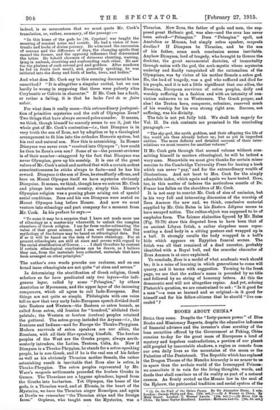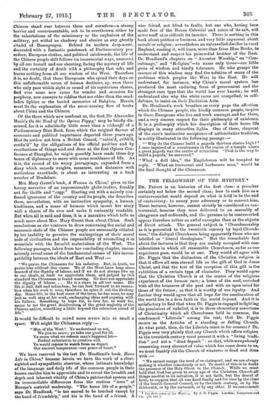BOOKS ABOUT CHINA.*
STILL they come. Despite the "forty-parson power" of Blue Books and Missionary Reports, despite the educative influence of financial advisers and the investor's close scrutiny of the loan securities offered by the Government at Peking, China remains to-day for the great mass of Europeans a land of mystery and hopeless contradictions, a portion of our planet still peopled by inscrutable shadows, a region as remote from our own daily lives as the mountains of the moon or the Palestine of the Pentateuch. The Republic which has replaced the Dragon Throne of the Manchu hierarchy is no nearer to us in space than the archaic world of the Ironcapped Princes: we auscultate it in vain for the living thoughts, words, and deeds that shall convince us of its reality as part of a natural cosmos. As firmly rooted as the Mosaic law in the soul of the Hybrew, the patriarchal tradition and social system of the • (I) On the Trail of the Opium Poppy. By Sir Alexander Boat. 2 rota. London : George Philip and So. (25e. not.]—(2) A Woman in Chin. By Nary Gaunt. London : T. Werner Laurie. (15s. 555.1-13) Homo Lift is China. • By Inao Taylor Headland. London Methuen sod Co. (10. Gd. oda
Chinese stand ever between them and ourselves—a strong barrier and unsurmountable, not to be overthrown either by the exhortations of the missionary or the exploaives of the military, yet withal as shadowy and elusive as any ghostly citadel of Demogorgou. Behind its modern drop.scene, decorated with a fantastic patchwork of Parliamentary pro- cedure, European clothes, and political catchwords, the life of the Chinese people still follows its immemorial ways, unmoved by all our tumult and our shouting, facing the mystery of life and the certainty of death with a philosophy that asks and learns nothing from all our wisdom of the West. Therefore it is, no doubt, that those Europeans who spend their days on this unfathomable ocean of human destinies, ay, even those who only pass within eight or sound of its mysterious shores, find ever some new cause for wonder and occasion for prophecy, new answers to riddles that are older than the sand. laden Sphinx or the buried memories of Babylon. Herein must lie the explanation of the never-ceasing flow of books about China and the Chinese.
Of the three which now confront us, the first, Sir Alexander Hosie's On the Trait of the Opium Poppy,' may be briefly dis- missed, for it is admittedly little more than a rechaufe of a Parliamentary Blue Book, from which the original flavour of economic and political importance departed three years ago. Had its author not been a British Consul, " cabin'd, eribb'd, eonfin'd" by the obligations of his official position and by recollections of things said and done at the first Opium Con- ference at Shanghai, he might possibly have made these dry bones of diplomacy to move with some semblance of life. As it is, the record of his weary jonrneyings, expanded from a diary which records weights, measures, and distances with meticulous exactitude, is about as interesting as a back number of Bradshaw.
Mrs. Mary Gaunt's book, A Woman in China," gives us the breezy narrative of an impressionable globe-trotter, frankly out for thrills and "copy." Starting out with a naively con- fessed ignorance of the country and its people, she describes them, nevertheless, with an instinctive sympathy, a human kindliness, and a sense of humour which invest her story with a charm of its own and make it eminently readable. But when all is said and done, it is a narrative which tells us much more about Mrs. Mary Gaunt than about China. Stith conclusions as she ventuires to draw concerning the social and economic state of the Chinese people are necessarily vitiated by her inability to perceive the mainsprings of their moral eode of civilization and the impossibility of reconciling it in essentials with the forceful materialism of the West. The following passages, taken from her concluding chapter, uncon- sciously reveal some of the fundamental causes of this incom- patibility between the ideals of East and West :- " We praise the Chinaman for his industry. But, in truth, we praise him without due cause. Wo of the West have long since learned of the dignity of labour, and if we do not always live up to our ideals, at least Ave appreciate them, and judged by this standard the Chinaman is found wanting. He does not appreciate the dignity of labour. . . . He is a slave in all but name. His life is dull, dull and colourless; he can look forward to no recrea- tion when his work is over, therefore he spins it out the livelong day. Homo life, in the best sense of the term, be has none, he may just as well stay at his work, exchanging ideas and arguing with his fellows. Something to hope for, to live for, to work for, seems to me the great desideratunt of the great majority of the Chinese nation, something a little beyond the colourless round of life."
It would be difficult to crowd more errors into so small a space. Well might the Chinaman reply :— " Men of the West! Ye understand us not, We you no more ; ye take our good for ill. Ye scorn what we esteem man's happiest lot—. Perfect submission to creative will.
Ye would rejoice to watch from ne depart
Our ancient temperance—our peace of heart."
We have reserved to the last Dr. Headland's book, Home Life in China,' because herein we have the work of a clear- sighted and sympathetic observer, whose intimate knowledge of the language and daily life of the common people in their homes enables him to appreciate and to reveal the breadth and depth and inherent vitality of China's patriarchal system and its irreconcilable differences from the restless "isms" of Europe's material modernity. "The home life of a people," says Dr. Headland, "is too sacred to be touched except by the hand of friendship," and his is the hand of a friend. A
wise friend, not blind to faults, but one who, having been made free of the House Celestial and eaten of its salt, will neversooff titer ridicule its inmates. There is nothing in this book about politics or business, and very little argument about morals or religion ; nevertheless an nutravelled dweller in rural England, reading it, will learn, more than front Blue Books, to understand and respect his primordial brother of the East. Dr. Headland's chapters on "Ancestor Worship," on " Con- cubinage," and "Religion"—to name only three—are little gems of wisdom and kindly tolerance. He who grasps the essence of this wisdom may find the solution of many of the problems which perplex the West in the East. He will understand, for instance, why China's moral system has produced the most enduring form of government and the strongest race type that the world has ever known; he will understand also why the white races are compelled, in self- defence, to insist ou their Exclusion Acts.
Dr. Headland's work breathes on every page the affection which the Chinese people, the kindly common people, inspire in those Europeans who live and work amongst and for them, and a very sincere respect for their philosophy of existence. It is a philosophy which his description of their home life displays in many attractive lights One of these, eloquent of the race's instinctive acceptance of authoritative tradition, is neatly illustrated in the following passage:-
"' Why do the Chinese build a pagoda thirteen stories high f " I once inquired of a countryman in the region of a temple where a great pagoda was the centre of attraction. • That is the way to build a pagoda,' be answered."
" What a dull idea," the Englishman will be tempted to reply. " What an irreverent and barbarous man," would be the final thought of the Chinaman.



































 Previous page
Previous page